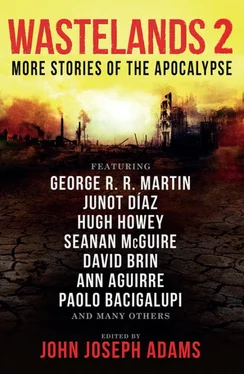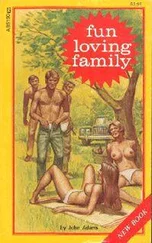“Started with what?”
Jimmy pointed across the northbound lanes, to a small stand of trees. “In there, I think. That’s a good place.”
“A good place for what ?”
Jimmy cocked his head. “To bury them.”
Patrick stiffened, and his gaze turned to stone. “They go in the ground when we get to Florida.”
“You won’t get to Florida. Florida’s a long way away.”
“Let me worry about that.”
“But they want to finish dying.”
Patrick didn’t answer. A muscle worked restlessly in his jaw.
“If you were a dead person, would you want to be in a wagon right now, rotting your way down to Florida?” Jimmy shook his head. “I sure wouldn’t. I’d want to be in the ground, where I’m supposed to be.”
Patrick grabbed a handful of Jimmy’s apron. “Shut up. Shut up or I swear to God I’ll kill you.”
“You’re being irrational. And you’re scaring away my customers.”
“You don’t have any customers, you fucking lunatic.”
“Well of course I don’t. There’s a wagon full of dead children at my front door.”
Patrick let go and stepped back, his eyes wide, and started laughing: hard, mirthless barks that erupted out of him like thick gouts of earth. He crossed his arms over his chest and held his sides and laughed. Tears spilled out the corners of his eyes. He bent over at the waist, went down on one knee, planted an arm on the ground for support. Laughing.
And then he lurched to his feet and grabbed a shovel and stepped onto the highway and swung at the windshield of the nearest car, again and again. When the windshield shattered, he pounded the hood into a warren of dented canyons, and struck off a rearview mirror with the thin of the shovel blade, then swung the flat against the driver’s side window. The car’s alarm sounded, a bleating horn that rose from a mild whoop to a stuttering scream. He tore open the hood and started on the engine. The alarm cut off.
Jimmy watched the birds while the car died beside him. Many of them were drab and uninteresting, but there were a few blue jays and robins, snatches of color fluttering between the vehicles, picking at what remained of the desiccated bodies inside. Before the plague, he’d never thought much about birds, except when they crapped on his car, and those had been uncharitable thoughts.
Finally, Patrick threw down his shovel and staggered back. The car was a crumpled, shattered nightmare image of itself, sitting dead and canted in the center of a halo of broken glass. He collapsed heavily on the tarmac, slumped forward, breathing hard, head sunk into the hollow of his shoulders.
Jimmy picked up the shovel and held it out to him. “It’s getting late.”
“It’s the boy’s birthday today,” said Patrick, quietly.
“Dead people don’t have birthdays. Only alive people.”
Patrick looked up. “You’re a fucking monster, you know that?” But he said it without conviction, or heat, and a moment later took the shovel.
They steered the wagon between the rows of frozen traffic, to the opposite verge. The trees in the cluster Jimmy had chosen were denuded and emaciated, and managed to throw only a patchwork skein of shade on the earth beneath them. Three plywood headstones poked out of the ground, like numbered chits from an ancient cash register. They said: Audrey , Frances , Kevin .
“Someone’s already here,” said Patrick.
“There’s room,” said Jimmy, and plunged his shovel into the earth, stepped on the blade to drive it down.
“Aren’t you curious? About who these people are?”
“No.” He levered out a clod of dirt. “I know who they are.”
Patrick waited, but Jimmy had nothing more to say on the subject, so he bent to the work.
* * *
Two hours later, they had a broad, short, deep grave. Patrick threw down his shovel and wiped the sweat out of his eyes and went to the wagon and drew off the tarp. The little girl stared blindly up at him with red, swollen eyes. He lifted her, then dropped to his knees and lowered her gently into the hole. Laid her legs straight, crossed her arms over her chest, smoothed the hair away from her face. Then he did the same for the boy. As if he were putting them to bed.
“Do you want to say something?” said Jimmy, after a short silence.
“Like what?”
“Like a prayer, maybe.”
“I don’t pray anymore,” said Patrick, and he began to cry, quietly.
“I prayed,” said Jimmy. “When I buried Frances, I said, ‘Please God give her the pony she always wanted.’ And when I buried Kevin, I said, ‘Please God let him play with boys his own age,’ because he didn’t get to do that much when he was alive. And when I buried my wife, I said, ‘I’ll miss you forever.’ Which wasn’t a prayer, I guess.” He paused, considering. “Well, maybe it was a prayer to her.”
They stood for a while. Patrick said: “Go away, Jimmy.”
“Okay. Just call me when you’re ready.” Jimmy put down the shovel and stepped out of the circle of trees and wandered for a while between the cars until he found a cache of magazines in the back of an old Nissan. He climbed onto the roof of a nearby van and lay down on his back and opened a Reader’s Digest .
He was just finishing an article about the many benefits of fiber when he heard the sounds of labor from the copse: the hiss of a shovel, the dry skitter of falling dirt. He put down the Reader’s Digest and looked up at the sun, just cresting the apex of its arc, then down at the river of cars that stretched southbound down 95, into the day’s bright and empty horizon.
* * *
Margaret batted at the air. Her left eye had darkened into an angry shade of purple, nearly black. Her skin was white and marbled with capillaries that stood out against the pallor like a skeletal roadmap. Her hair was falling out in clumps, exposing patches of white scalp.
Jimmy caught up her hands and held them. He said: “Nothing you’re seeing is real.”
“They’re eating me.” She spoke in a cracked, guttural whisper. “They won’t stop eating me.”
“No they’re not. Come on, I have something to show you.” He knelt and put one arm under her back, the other in the joint of her knees, and lifted her. She was fragile as a bird, and weighed nothing at all. A papier-mâché doll of a woman.
The air outside had turned chilly. The sun hung just over the tops of the trees, red and purplish, tinting the sky in fading orange strata. Jimmy climbed onto the highway and made for the van he’d sunned himself on earlier, moving quickly. Patrick was waiting on the roof. He handed her up, then scrambled after.
“You should leave her alone,” said Patrick, his lips pursed in a prim expression of disapproval that seemed wildly out of place on his broad, rough-hewn features. But he helped ease her into the low beach chair they’d brought up earlier.
Jimmy knelt down and shook her, gently. “Time to wake up, Margaret.”
Margaret let her head loll to the side. Her good eye, pink now, rolled toward him. “You’re on fire,” she said.
“I’m not on fire. Wake up now. There isn’t much time.”
But she shook her head, and kept shaking it, a gesture that shaded from refusal to anger to despair. Jimmy put his hands on either side of her head, steadying it, and brought his face close to hers and waited until her darting eyes slowed and found his.
“Good,” said Jimmy. He swung around to sit beside her, draped an arm over her shoulder, and pointed at the cars below, a frozen river of metal and glass flowing endlessly southward. “Now watch.”
Patrick frowned and shook his head, said something, but Jimmy wasn’t listening. He was staring westward, at the setting sun. As he watched, its lip touched the top of the treeline and spread instantly across, limning the rich dusky greens in red and gold. He turned back to the road, and said: “Okay, here it comes.”
Читать дальше












